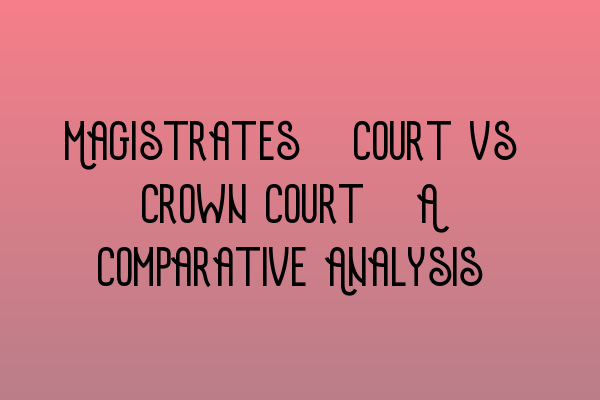Magistrates’ Court vs Crown Court: A Comparative Analysis
When it comes to criminal law proceedings in the UK, two courts play a vital role – the Magistrates’ Court and the Crown Court. Understanding the differences between these two courts is essential for anyone involved in the criminal justice system. In this article, we will provide a comprehensive comparative analysis of the Magistrates’ Court and the Crown Court.
1. Magistrates’ Court
The Magistrates’ Court is the lower court in the UK’s criminal justice system. It handles the majority of criminal cases, such as minor offenses, summary offenses, and preliminary hearings for more serious offenses. Magistrates, who are trained laypeople, preside over cases in the Magistrates’ Court.
One of the key advantages of the Magistrates’ Court is its accessibility. It is easily accessible to the general public, and defendants can often represent themselves without the need for legal representation. However, for more complex cases, it is advisable to seek legal advice or representation.
Some cases in the Magistrates’ Court may be sent to the Crown Court for trial, especially if the offense is more serious and requires a higher level of punishment. The decision to send a case to the Crown Court is usually made based on the seriousness of the offense or the defendant’s choice for a trial by jury.
2. Crown Court
The Crown Court is the higher court in the UK’s criminal justice system and deals with more serious offenses. It has greater authority and power compared to the Magistrates’ Court. Cases in the Crown Court are presided over by a judge with a jury present to determine the defendant’s guilt or innocence.
Trials in the Crown Court are generally more formal and complex compared to those in the Magistrates’ Court. Legal representation is highly recommended in the Crown Court, as the stakes are higher, and the procedures can be more intricate. Barristers and solicitors with expertise in criminal law often handle cases in the Crown Court.
The Crown Court usually deals with indictable offenses, which are more serious crimes such as murder, rape, drug trafficking, or fraud. Defendants who are found guilty in the Crown Court face higher penalties, including longer prison sentences or hefty fines.
3. Key Differences between the Magistrates’ Court and the Crown Court
Now that we have explored the basics of both courts, let’s highlight the key differences between them:
- The jurisdiction: The Magistrates’ Court has limited jurisdiction and handles less serious offenses, while the Crown Court deals with more serious offenses.
- The decision-making process: In the Magistrates’ Court, magistrates make decisions on all aspects of the case, whereas in the Crown Court, the judge provides legal guidance, and the jury determines the defendant’s guilt or innocence.
- Sentencing powers: The Magistrates’ Court can impose limited sentences, such as fines, community orders, or short-term imprisonment. In contrast, the Crown Court has greater sentencing powers, including longer prison terms.
- Procedure: The procedures in the Magistrates’ Court are generally less formal and more accessible to defendants without legal representation. In contrast, the Crown Court follows more formal and complex procedures.
- Legal representation: While legal representation is not mandatory in the Magistrates’ Court, it is highly recommended in the Crown Court due to the complexity of the cases and potential severe consequences.
Understanding the nuances and differences between the Magistrates’ Court and the Crown Court is crucial for anyone involved in the criminal justice system, including defendants, legal professionals, and stakeholders. Each court serves a unique purpose and plays a significant role in maintaining law and order in society.
Conclusion
In conclusion, the Magistrates’ Court and the Crown Court are two distinct entities within the UK’s criminal justice system. While the Magistrates’ Court deals with less serious offenses and requires limited legal representation, the Crown Court handles more severe crimes and follows complex procedures. It is important to seek legal advice or representation when dealing with cases in either court to ensure a fair and just outcome.
For more information on the UK’s criminal justice system and legal studies, consider exploring our related articles:
- SQE 1 Practice Exam Questions
- SQE 1 Practice Mocks FLK1 FLK2
- SQE 2 Preparation Courses
- SQE 1 Preparation Courses
- SRA SQE Exam Dates
